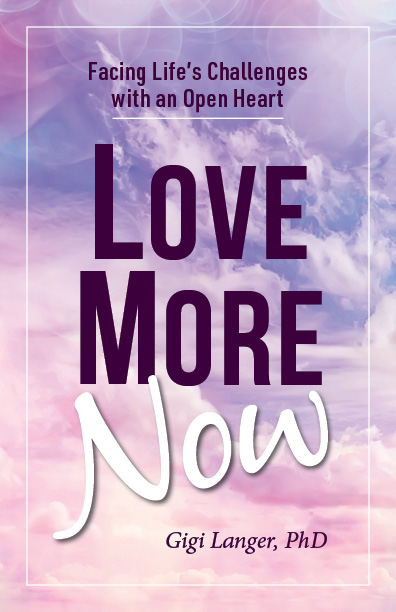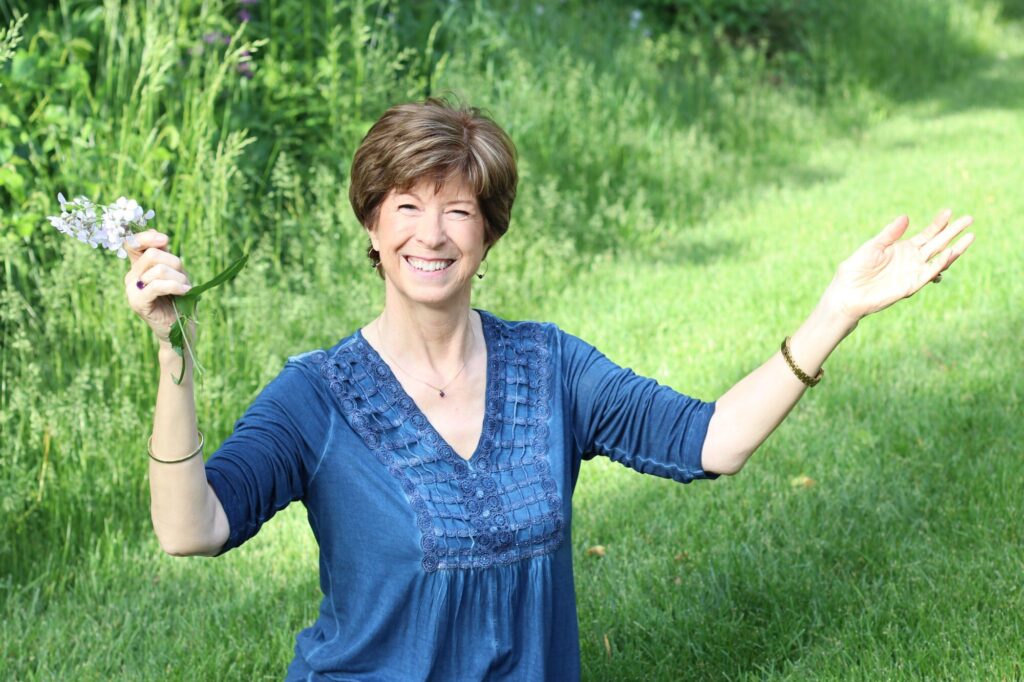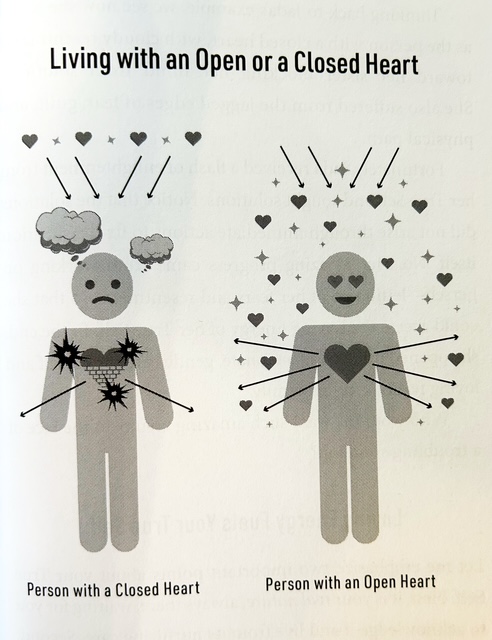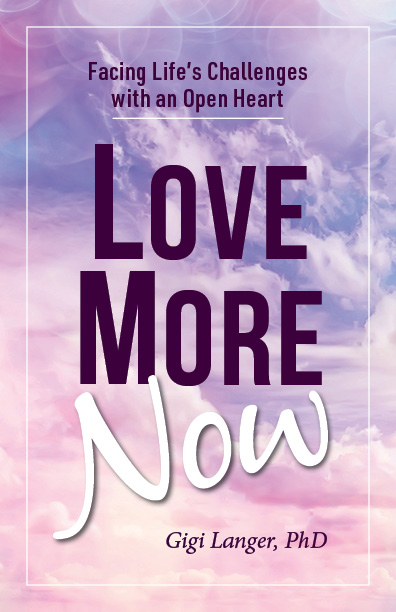The Rest of the 12 Steps (from Love More Now by Gigi Langer
Step 4. Courage
Made a searching and fearless moral inventory of ourselves.
Notice the word fearless. You might ask, Where do we get the courage to go on? Note that coeur, the French word for heart, is the root word for courage. For some time now, you’ve been opening your heart to this powerful flow of Love. And now it’s time to use it.
Let’s face it, addiction is the opposite of courage. It’s the chicken’s way out. I can’t handle who I am, so I’ll hide it. Once into recovery, many balk at Step 4, as fear and shame whisper, I don’t want to face it. All that nasty stuff will come gushing out and overwhelm me. When we’re afraid to go on, many suggest backing up to the prior Step until we can trust that Love has our backs. It’s also helpful to begin the inventory with a list of our assets.
Although I too feared that the ugly would come out all at once, that didn’t happen. In fact, the wisdom of my True Self allowed my secrets to emerge only when I was ready. Some of the scariest things didn’t arise until I was a few years sober, thank God!
So, how do we take a fearless moral inventory? The primary text of AA illustrates how to examine our resentments, fears, and sexual behavior. In each area, we are to consider how we’ve been holding on to the four main barriers to Love discussed earlier: Resentment, Self-Centered Motives, Self-Deception, and Self-Condemnation.
As we move through the steps, we notice how certain roles learned early in life have been sabotaging our ability to function in healthy ways. I described these six patterns in Chapter 2, pages 38–40: Caretaker, Martyr, Perfectionist, People Pleaser, Workaholic, and Tap Dancer. In Chapter 4, pages 83–85, you’ll see how I combined the four barriers and six patterns into a ten-question inventory that may be helpful in understanding how we’ve been contributing to our misery in the face of life’s challenges.
By reflecting on our habitual responses in this way, we can begin to face and change them. But only if we don’t keep them a secret.
Step 5. Integrity
Admitted to God, to ourselves, and to another human being the exact nature of our wrongs.
I’ve often heard that we’re only as sick as our secrets. Indeed, what stays hidden tends to spawn shame and guilt, corrosive poisons that eat away at us. The purpose of Step 5 is to dissolve the shame that’s been blocking the integrity of our True Selves.
When we share our inventory with our sponsor or a trusted third party, we’re amazed that they don’t frown or go running away when they hear our misdeeds. Often, they reply by sharing a few of their own, some of them quite awful. This caring experience goes a long way toward healing our self-condemning whispered lies. Remember the Master-Beaters Club in Chapter 2, page 29–30? That habit began to dissolve as I felt my sponsor’s unwavering loving care, regardless of the secrets I revealed to her.
Although facing another human being with my flaws wasn’t easy, the hardest part was admitting them to God (Loving Energy). I was so afraid I’d be judged as unworthy of Divine Love. But that wasn’t the case. Sharing my inventory removed my distrust and opened my heart to give and receive love in a healthy way.
But taking responsibility for our part in our troubles is only another beginning. We’ve not yet decided whether we’re ready to give up our self-defeating patterns.
Step 6. Willingness
Were entirely ready to have God remove all these defects of character.
They say at meetings that when we let go of a “defect” (what we’ve been calling a fearful pattern), it has scratch marks all over it. Why? Because, even though we’ve admitted that our old coping strategies have been blocking Love from our lives, we’re not immediately willing to let go of them. Part of us still insists we need them to feel safe.
To become “entirely ready,” most of us need to get so sick and tired of our old ways of handling life that we’re finally willing to let them go. How wise for the founders of AA to make a space for our hesitation, to allow for patience while we wait, staying connected to our program and trusting the process.
This example illustrates how a common defect, low self-esteem, can be healed through Steps 6 and 7. My friend, DeeDee, believed the whispered lie, They don’t love me, so I must not be worthy of love. This whispered lie and its buddy, If they did love me, they would (or wouldn’t) be doing this, saying this, etc., had set her up for failed relationships, addiction, codependency, and a lifetime of resentments.
As DeeDee progressed through Steps 4 and 5, she began to realize that she had set up unrealistic, unenforceable rules for how people must show her loving care. Coincidentally, she was taking a course that required her to ask her mother to list DeeDee’s positive attributes. She said her mother’s list felt “like a stab in the gut” because it referred to DeeDee’s relapses, and implied she was better at loving her pets than her family. When DeeDee asked me for feedback, I wrote:
“ Yes. There it is in black and white. How she still judges you and withholds love. Ouch. She’s right in implying that your family relationships have been out of kilter. Alcoholism and old fears and patterns will do that. This is perfect Step-6 timing. The constant perception of ‘not being lovable’ has run its course and you seem ‘entirely ready’ to have it removed. And when you ask for its healing, your higher power will help you to see it (and your mother’s reactions) differently. In the meantime, let’s work on softening your heart toward your mother. Remember that she’s been scared witless by your relapse earlier this year. She’s human and loves you desperately while struggling to handle her fear. Here are two suggestions: Bless her by praying that she has everything that will make her happy, and then list all of her positive qualities. We’ll know this pattern is healed when, regardless of what she says or does, you’ll rather quickly see the love underneath her words. It may take a little time, but it will happen. Let’s move on to Step 7 to get free of your old resentments.”
Step 7. Humility
Humbly asked Him to remove our shortcomings.
The word humility is too often misunderstood as a weakness. Try thinking of it this way instead: Humility isn’t thinking less of myself; it’s thinking of myself less often.
In DeeDee’s case, even though she had low self-esteem (thought less of herself), she spent many hours thinking of herself, rehashing how she wasn’t getting loved in the ways she demanded. She couldn’t humbly open her heart to her mother until she asked Loving Power to remove her resentments and self-centered demands.
The opposite of humility is false pride: I can force the world to give me what I want. Fortunately, we’ve begun to deflate our pride by admitting and listing our fears and patterns in Steps 4, 5, and 6. Now, in Step 7, we finally ask to be changed, to be free of our old heart-closing ways. Knowing we can’t do it on our own, we turn to a power greater than our fears. As my friend Mark A. Lord says, “Let God (Love) do the heavy lifting.” All we need to do is ask with sincerity and a willingness to get out of the way.
Here’s the Seventh-Step prayer that DeeDee and I said at our next meeting.
“ My creator, I am now willing that you should have all of me, good and bad. I pray that you now remove from me every single defect of character which stands in the way of my usefulness to you and my fellows. Grant me strength as I go from here, to do your bidding.”60
As of this writing (many months after this incident), DeeDee is open-hearted toward her mother and rarely feels rejected when her mother mentions DeeDee’s past relapses. The Seventh-Step prayer worked!
Note that the Step 7 prayer asks that we be free of anything “that stands in the way of my usefulness to you [God/ Loving Energy/True Self] and my fellows.” Even though we want emotional relief from our fears, problems, and isolation, our personal transformation is really about becoming useful by loving and helping others.
Step 8. Discipline
Made a list of all persons we had harmed and became willing to make amends to them all.
An amend is a mending, a closing of the separation from others. Recall the image on page 82 in Chapter 4 that showed the difference between open-hearted connection and closed-hearted separation.
We can easily discover those we have harmed by the twist of discomfort in our gut when we think of them. That discomfort is a sign of regret over our past behavior.
When listing those we’ve harmed, some sponsors have us make three lists: 1) Yes, I’m willing when the time is right; 2) No, I’m not yet ready, and 3) Hell, no. Never! The names may change lists from time to time, but for now, they just sit there. In the meantime, we trust Loving Energy and our sponsor to guide us to the right people with the right words at the right time.
Before approaching anyone to make amends, we need the discipline to reflect on our motives. Too often, especially early on, our motive is to get rid of our awful feelings of shame, without regard for the other person. When driven by such urges, our amends are likely to be seen as what they are: another bid to make ourselves feel better. No. This is about staying sober and loving others, unencumbered by guilt.
Again, AA’s wise founders have allowed us time to become spiritually centered before we try to heal damaged relationships. In other words, we wait until we’ve softened our heart toward the individual. This may take a while. In my case, I had to wait five years to make amends to one of my ex-husbands. It can only happen when our hearts are ready and our motive is pure.
Step 9. Forgiveness
Made direct amends to such people wherever possible, except when to do so would injure them or others.
Forgiveness is a central piece of making amends. When our hearts are open, we can forgive the other person for their part (if any) in the incident. Then we can focus on our part and finally forgive ourselves.
Saying, “I’m sorry” is not usually sufficient, as it doesn’t mend much of anything. Most people start with a statement of how much they appreciate the other person. Then they explain that they’re in recovery and trying to mend their past. They briefly describe their offending words or actions, without adding the gory details. Finally, they ask the person how they can make up for the wrongdoing. If the request is possible and within reason, they do it.
Note the words at the end of Step 9: “Except when to do so would injure them or others.” This means that we don’t have the right to feel better at someone else’s expense. Step 9 is not about blame or revenge; it’s not about the past at all. It’s about clearing our conscience and opening our hearts to ourselves and the other person.
Most of us fear that the person we harmed will respond with anger. Even if they do, we’ve learned through our step work that our security is not in someone else’s hands. We’ve done the right thing by reaching out, and we realize the amends are about cleaning up the wreckage of our past as best we can. How the other person takes it is up to them.
Also, note the words, “made amends wherever possible.” If it isn’t possible, we can write a letter or imagine talking to their spirit/True Self.
Finally, let’s consider the idea of living amends. One of the best ways to make amends with those we see often is to open our hearts to them by offering consistent kindness and compassion. We also demonstrate how we’re taking good care of ourselves by conscientiously working the Steps with a sponsor. Over time, and with consistent decent behavior, we transform the damaged relationships into ones of trust and Love.
Step 10. Acceptance
Continued to take personal inventory and when we were wrong promptly admitted it.
Because we’re changing a lifetime of self-centered fears and patterns, they won’t all improve at once. Indeed, the more we reflect on them, the more quickly we notice when we’ve done or said something that doesn’t align with our new, positive changes. This is where acceptance comes in. We no longer try to be perfect; we merely claim spiritual progress.
Whether the wrong is to us or another, we promptly use an abbreviated form of Steps 4–7 to look at our part. With practice, we get the hang of noticing when our old ways are disturbing our peace of mind. We do a quick personal inventory and place our fears and patterns in Love’s hands. And of course, if we’ve harmed someone, we make amends.
Here’s a rather humbling situation where an old pattern caused me to hurt another. One day at a Twelve-Step meeting, a man stood up and said very dogmatically that only the “real alcoholics” should be there. His inflexible tone sounded just like my mother when she drunkenly talked about politics, and I felt that same old fear and anger. I knew that tender spot had been triggered, but that didn’t stop me from talking to him after the meeting.
Driven by my fear, I tried to convince him how his words had threatened the primary purpose of AA, to help anyone who had a desire to stop drinking. But my superior tone didn’t change his mind. In fact, after a few minutes of listening to him defend his position, I grew frustrated, turned away, and said in a nasty voice, “It must be great to be so right all the time!” Oops! Self-will run riot!
Later, I did a quick inventory, admitting that I had started our conversation with a closed heart and a desire to change him, even though he’d never asked for my advice. Fear, self-deception, perfectionism, and self-condemnation had crept into my mind and closed my heart against him. After discussing the situation with my sponsor, I knew I needed to call him to confess my tender spot and apologize. Thank God, he was quite gracious about it.
That experience taught me to delay my responses when my inner child gets triggered. Instead of reacting, I need to get quiet and take good care of my own feelings. Then, and only then, if it’s important to address the issue, I do. I’ve also learned to avoid or stay quiet around those who dogmatically insist they are right.
Step 11. Knowledge and Awareness
Sought through prayer and meditation to improve our conscious contact with God as we understood Him, praying only for knowledge of His will for us and the power to carry that out.
My AA friends say that praying is talking to God, and meditation is listening for God’s response. In Chapter 3, pages 61–64, we explored meditation at length, but we haven’t talked much about prayer.
Step 11 encourages us to pray “only for knowledge of His will for us and the power to carry that out.” I believe that God’s will is for us to open our hearts to the divine essence of every person we encounter, as stated in ACIM Lesson 45, “God is the mind with which I think.”61 This lesson asks me to allow Love to be the source of my thoughts. I do this by increasing my conscious contact with Loving Energy.
Early in recovery, I had never prayed and doubted that prayer would do much good. However, I decided to try it after reading Karen Casey’s six persuasive reasons to pray.
- Prayer promises relief when we are anxious.
- P rayer connects us with our higher power when we feel isolated and full of fear.
- P rayer frees our minds from the obsession to plan other people’s lives.
- P rayer helps us take action when we feel compelled to change the circumstances of our lives.
- P rayer becomes a wonderful resource to draw on when living through our painful moments.
- A nd prayer gives us the willingness to accept God’s solution for every problem that plagues us.”62
When I get quiet and sincerely ask to see beyond my fearful, negative thinking, I gain access to the comfort, courage, and wisdom of Loving Energy. As we commit to aligning our thoughts with Love, we will increasingly know how to handle situations that used to baffle us.
Step 12. Service and Gratitude
Having had a spiritual awakening as the result of these Steps, we tried to carry this message to alcoholics, and to practice these principles in all our affairs.
I think of a spiritual awakening as learning how to notice— and then reject—fear’s destructive patterns and lies so that Loving Energy can inspire my True Self for the benefit of all.
We’ve heard about carrying the message to help other alcoholics, but what about practicing “these principles in all our affairs?” The short version is to strive for open-hearted living by showing Love, kindness, and care in our daily lives.
We learn to give and receive Love through relationships because we are both students and teachers to each other. Imagine several people holding hands while climbing a hill. The first person leads the person behind him, this person helps the one behind him, and so on. A stronger person helps us grow, so we can extend that strength to another. This is how recovery and most other growth paths work.
Talk to anyone who’s been following a Twelve-Step program, and you’ll find they’ve gained not only freedom from addiction, but they also enjoy loving families, amazing jobs, priceless peace of mind, and a subtle joy in life. Even when the hard times come, they have supportive love around them to help them through.

My newest book, Love More Now: Facing Life’s Challenges with an Open Heart is only $9.99 –available from Amazon HERE.
Get my award-winning book, 50 Ways to Worry Less Now, for only $6.00 at GigiLanger.com/buy (or get e-book at Amazon) ** Thank you for POSTING your REVIEWs on Amazon. **
Gigi Langer has been sober for over 35 years, and holds a PhD in Psychological Studies in Education from Stanford University. Her 50 Ways to Worry Less Now won an Indie Excellence Award in 2019. Gigi worked at Eastern Michigan University for 25 years, and now lives happily in Florida with her husband, Peter and her cat, Easter.



